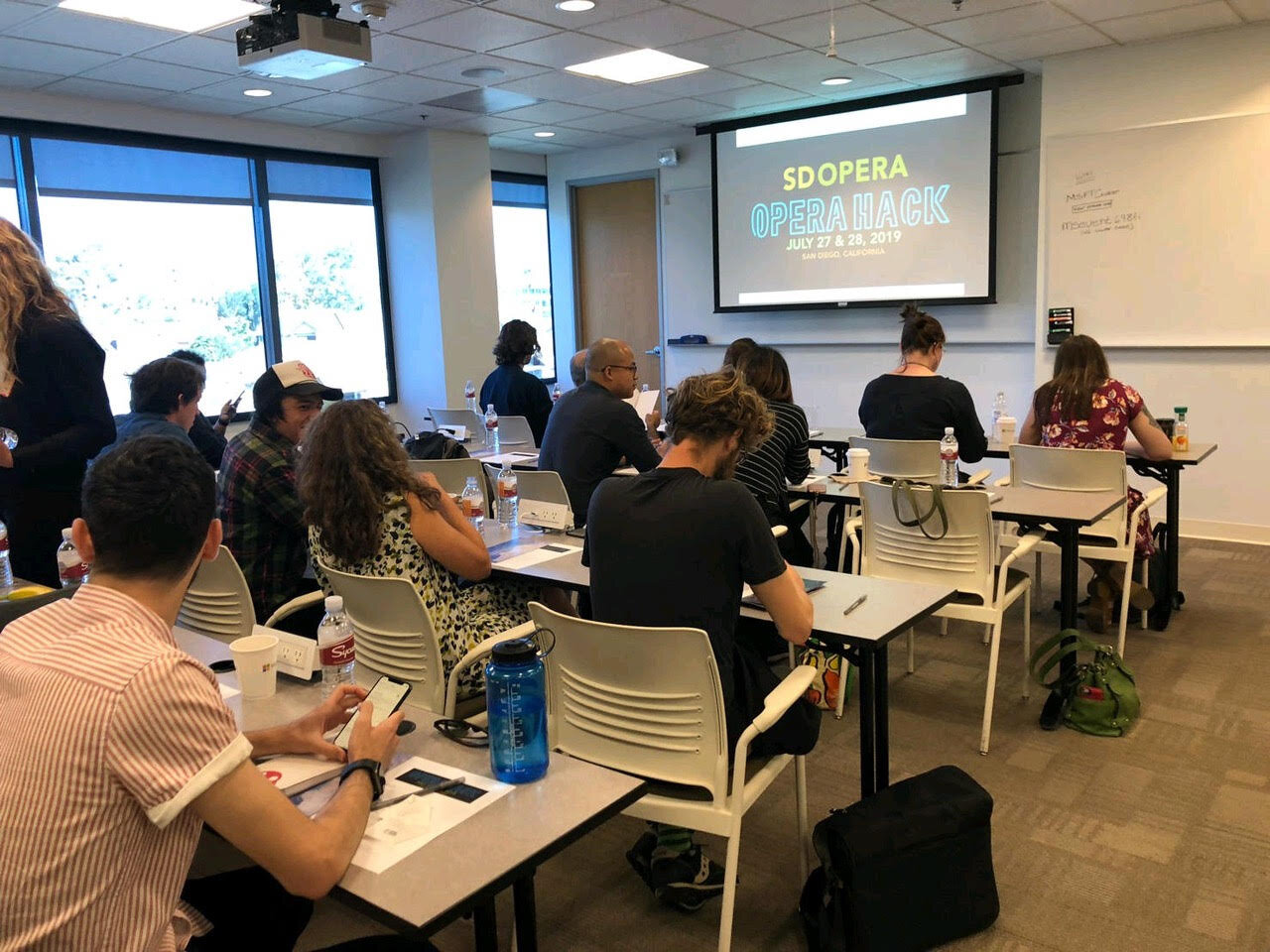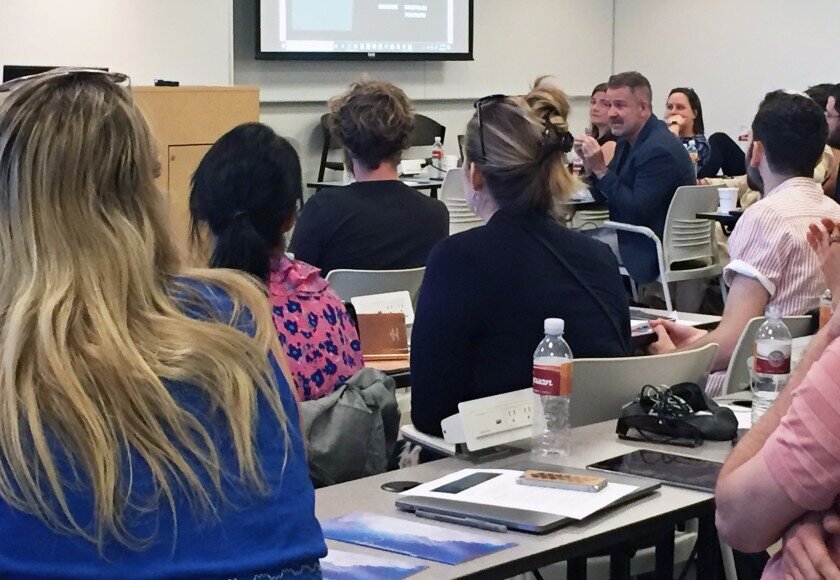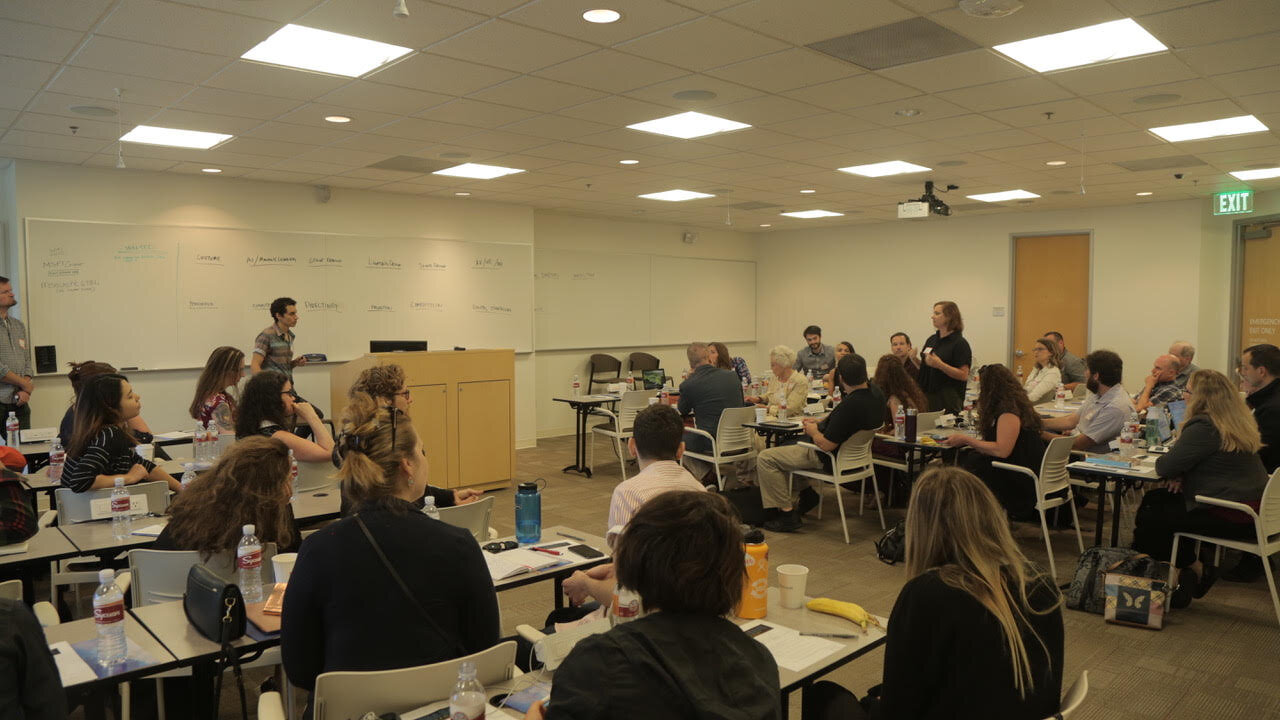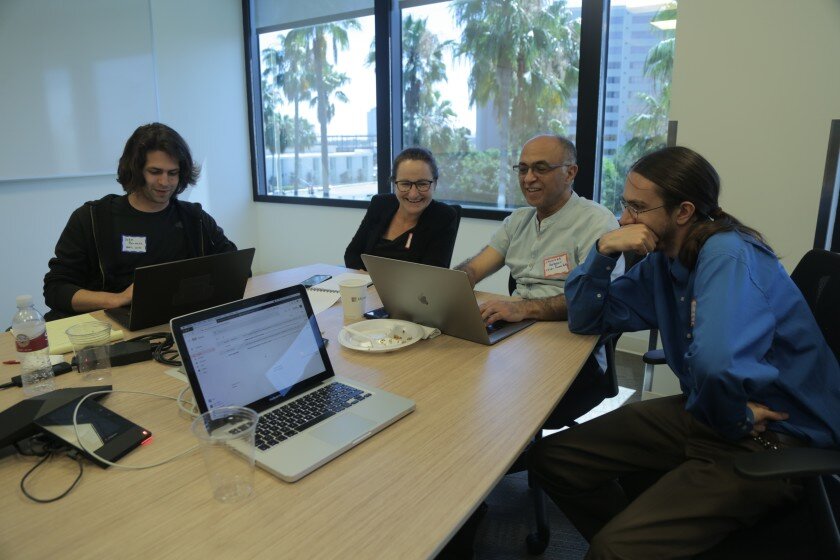Librettist Mark Campbell, photographed on Fire Island, New York.
(Santa Fe, NM) - When news of Mark Campbell’s librettist prize with OPERA America hit the internet, I sent him a congratulatory Facebook DM. What ensued was a weeks-long conversation that resulted in the wonderful Q&A below. In addition to The Campbell Opera Librettist Prize (COLP), Mark is a man who’s remained just as prolific as he was pre-pandemic, making his ongoing flight into artistic headwinds seem absolutely doable, an inspiration to all of us during these difficult times. With the arrival of new collaborations, operas and another well-deserved 2021 Grammy nomination, this time with composer Paul Moravec for their Sanctuary Road oratorio, we thought a Q&A format would be best, no pun intended. We’re also honored to break some exclusive opera news: Mark’s currently writing a new theatrical song cycle with young, gay composer Matthew Ricketts, inspired by Derek Jarman's book, Modern Nature. Per Mark: “You probably know Jarman as a filmmaker, but he wrote this memoir in 1989-1990 after he’d purchased a fisherman's cottage in a desolate location on the English Channel, soon after he was diagnosed with AIDS.” All this and more revealed below via Mark’s trademark warmth, feeling and humor. JM
OI: How did you and Matthew Ricketts come together to begin creating this song cycle based on Derek Jarman's memoir? Given the context of Jarman's writings, an AIDS pandemic that's never gone away and the magnitude of our current public health disaster, this is a timely if not extremely real brief. You mentioned that this project would be an opportunity to write "more poetic text." Could you expand on that?
MC: When my husband and I moved into our modest home on Fire Island earlier this spring, I began imagining my little garden here. Around that time, I read a beautifully written article in The New Yorker by Rebecca Mead about filmmaker and gay activist Derek Jarman and the remarkable garden he created at Prospect Cottage, a scrappy fisherman's shack in Dungeness that he had purchased soon after his AIDS diagnosis. Jarman captured his experiences in 1989 and 1990 at this cottage in his very moving memoir, Modern Nature, and as I read the book, I felt inspired to write a song cycle about it. It sings.
Matthew and I had been "courting" each other as composer and librettist for a little over a year, I proposed the idea and he loved it. (By the way, Matthew who received a Guggenheim Foundation Award last year, is a composer to watch!)
Composer Matthew Ricketts. Photo credit: Michael Kuhn
I had originally thought of the work as a short (4 or 5 songs) song cycle, but the more I write the text, the more I see it as a complete theatrical evening, a contemplative structure similar to the libretto Kimberly Reed and I created for As One. I generally shy away from overt poetry when creating text for operas or oratorios—it tends to call attention to itself and distracts from the music. But with this piece—tentatively titled Unruly Sun—poetry seems right. Of course, I feel many strong personal connections to the story—moving away from a city to escape a pandemic, mortality and the garden, the need for a legacy, a gay man who lost many people to AIDS…the list goes on and on…and the more I enumerate these connections, the more I wince at the obviousness of them.
OI: Let's change directions a bit and talk about West Edge Opera's Aperture program. We love the real-time BTS aspect, tracking almost two dozen original works from the ground up. You're working with composer Kamala Sankaram, breathing life into My Own Country, a longtime dream project that chronicles an immigrant doctor's experiences in Johnson City, Tennessee while caring for people with AIDS during the early years of the crisis. I will sign myself up tout de suite, but what can you share with us about the process thus far?
MC: As you know, opera companies around the country are trying to find ways to remain connected with their communities during the pandemic. Mark Streshinsky, General Director of West Edge Opera, and his smart and mighty team, came up with the ingenious idea of spending more significant time exploring the process of composers and librettists when they create new operas. They audaciously chose 22 projects to feature and I'm flattered that my name appears on a roster with so many composers and librettists I respect and admire.
Composer Kamala Sankaram.
My Own Country, which I'm creating with the brilliant (and deservedly overworked) composer Kamala Sankaram is a piece I've been dreaming about creating for 25 years. It's based on Dr. Abraham Verghese's 1994 memoir (another memoir!) of the same name and chronicles his experiences as a doctor and an immigrant in Johnson City, Tennessee as AIDS begins to enter the community. Two years ago, New York Theatre Workshop gave Kamala and I a residency to begin work on the opera and I created an outline and she and I wrote a few songs. If WEO awards us a full commission, we would be able to complete this work.
OI: Several weeks ago, we started talking about your latest world premiere film project with composer Joe Illick and Fort Worth Opera, based in the now familiar universe of zoom. We've seen the extra Broadway World piece, so we'll have extra popcorn on hand as we watch your A-list cast navigate the "virtual comedy" of an online book club discussing The Handmaid's Tale. This sounds delicious and oh so you.
MC: Oh, I love working with Joe. We wrote two children's operas which are entering the repertoire very quickly. He asked me for an "adult" libretto and I came up with a story about a mean little book club that meets on Zoom for the first time at the end of April, 2020. It's a pretty bleak view about our country during this crisis and the threat of totalitarianism (expressed in the mute button), but I hope you won't notice that with the work of our director Cara Consilvio, our conductor Andy Whitfield and our crazily stellar cast (Brenda Harris, Bill Burden, Donnie Ray Albert, Joyce Castle and Gabrielle Gilliam).
Composer Paul Moravec and Mark Campbell worked for three years to adapt Stephen King's The Shining. Photo credit: Euan Kerr | MPR News (2016)
OI: In 2019, we were thrilled when you and Mason Bates won Grammys for The (R)evolution of Steve Jobs. It was also excellent to see you at Santa Fe Opera last summer to congratulate you in person. Interestingly, I watched the 2021 Grammy nominations via Twitter and didn't realize that you and Paul Moravec are nominated for Sanctuary Road, performed by Oratorio Society of New York (librettists not mentioned in Grammy noms, had no idea). Getting the full memo via Facebook (big congrats to you), I realized that it's impossible to keep up with opera's most prolific creative. In addition to a new, third oratorio with Mr. Moravec focused on voting rights, you mentioned a secret opera and The Secret River at Opera Orlando?
MC: Yeah, it's pretty ridiculous that the Grammys fail to credit the librettist for operas or choral works. (The Pulitzer does the same dumb thing, by the way.) Whining aside, I am very pleased with this nod from the Recording Academy for Sanctuary Road, a work I am very proud of. Paul is a master of musical drama and a fantastic collaborator and, yes, we are about to begin work on our third oratorio to complete a trilogy of operas about freedom. (Our second, A Nation of Others, set in Ellis Island in 1921, was to premiere at Carnegie Hall in May, again with the Oratorio Society of New York.) By the way, we are turning Sanctuary Road into an opera with stage director Dennis Whitehead Darling, who will also be directing The Secret River (music by Stella Sung) at Opera Orlando. The "secret" opera still hasn't been announced but I will say that it is for Des Moines Metro Opera and is a many-acred thing. Other works waiting to premiere are A Sweet Silence in Cremona (composer: Roberto Scarcella Perino); Supermax (composer: Stewart Wallace, co-librettist, Michael Korie); Edward Tulane (composer: Paola Prestini); again and again. and again (composer: Conrad Cummings) and This Lingering Life (composer: Anne LeBaron, co-librettist Chiori Miyagawa).
OI: The Campbell Opera Librettist Prize (COLP) was announced in late July 2020, in association with OPERA America. The competition opens up December 15th, with the winning librettist selected by a panel of independent experts in May 2021. We did the "opera librettist award" Google and 95% of the entries on that first page were for this award! So, in addition to brilliant branding, what was the inspiration for this nearly only one of its kind recognition for opera librettists?
MC: I've been very fortunate in that a number of my works (Silent Night, The Shining, The (R)evolution of Steve Jobs, Sanctuary Road, Elizabeth Cree, As One—and more) generate decent income in royalties and will continue to do so after I'm gone. As I was preparing my will about a year ago, I thought about what I might be able to contribute to the future of American opera. It's no secret that I've been and continue to be an advocate for librettists through the Dramatists Guild's Librettist Initiative, which I co-chair with librettist Michael Korie. It was probably through my work there, that I identified that there are no awards specifically for opera librettists. So I decided to create one. And fund it. Our industry has some truly brilliant librettists working in it now; I view the COLP as a way for opera to build on that by continuing to attract the best theatre writers.
Learn more and apply for OPERA America’s Mark Campbell Opera Librettist Prize.
Tickets now available for the 14-24JAN digital streaming of Bernadette's Cozy Book Nook.
Press Contact: Barbara Hogenson | (212) 874-8084 | BHogenson@aol.com
Visit markcampbellwords.com














